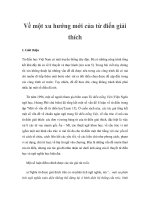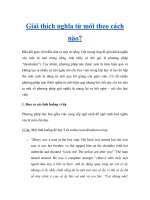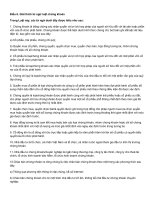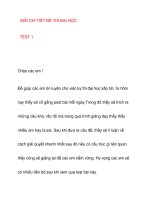Giải thích từ vựng_IELTS Cambridge 11_ Test 1 crop growing skyscrapers
Bạn đang xem bản rút gọn của tài liệu. Xem và tải ngay bản đầy đủ của tài liệu tại đây (507.24 KB, 5 trang )
Reading text 1: IELTS Cambridge 11 – Test 1
Crop-growing skyscrapers
Highlighted vocabulary:
No.
1
2
Words & Word Form
Conservative (a)
/kənˈsəːvətɪv/
Demography (n)
/dɪˈmɒɡrəfi/
demographic (a)
/dməˈɡrfɪk/
Meaning and/or Examples + Collocations
= to be lower/less than the real number or amount
conservative estimate (ước lượng dè chừng)
= the changing number of births, deaths, diseases, etc. in a
community over a period of time; the scientific study of
these changes (nhân khẩu học)
relating to the population and different groups within it
demographic changes/trends/factors
3
Hothouse (n)
4
(in) vogue
/ vəʊɡ/
= a heated building, usually made of glass, used for
growing plants in (nhà kính)
hothouse flowers / hothouse tomatoes
= a fashion for sth / a general liking (thời trang, mốt, phổ
biến, thịnh hành)
Examples:
• the vogue for child-centred education
• Black is in vogue again.
• Sixties music has come back into vogue.
• This novel had a great vogue ten years ago.
5
Scale sth up (verb)
/skeɪl/
Accommodate (v)
/əˈkɒmədeɪt/
= to increase the size, amount or importance of sth (đẩy
mạnh, thúc đẩy, tăng cường)
Cutting-edge (a)
/kʌ.tɪŋˈedʒ /
Drastic (a) / ˈdræstɪk/
Drastically (adv)
/ ˈdræstɪkl /
= the most modern / the most advanced / the newest
cutting-edge design/technology
= dramatically = extreme in a way that has a sudden,
serious or violent effect on sth (mạnh mẽ, dữ dội, quyết liệt)
Examples:
• Output has been drastically reduced.
• Things have started to go drastically wrong
Efficient (a)
/ ɪˈfɪʃnt /
≠ inefficient (a)
efficiency (n)
= working or operating quickly and effectively in an
organized way (có hiệu quả, có ích, có năng lực, có khả
năng)
Examples:
• efficient heating equipment
• the efficient use of energy
• We offer a fast, friendly and efficient service.
• As we get older, our bodies become less efficient
6
7
8
9
= to provide sb a place or enough room to sit or to live
= to serve (phục vụ)
Examples:
• The hotel can accommodate up to 500 guests.
• The aircraft is capable of accommodating 28
passengers.
•
at burning up calories.
fuel-efficient cars (= that do not use much fuel)
10
Implement (v)
/ˈɪmplɪment/
implementation (n)
= to carry out / to make / to do / to start doing sth (tiến
hành, thực hiện, thực thi)
• A new work program for young people will be
implemented.
• the implementation of the new system
11
Proponent (n)
/prəˈpəʊnənt/
Take sth for granted
= advocate (n) = a person who supports an idea or an
action = supporter (người ủng hộ, tán thành)
12
Take sth / sb for granted
13
14
Despoil (v)
/dɪˈspɔɪl/
Verdant (a) / ˈvɜːdnt /
= (1) to accept / believe something to be the truth without
even thinking about it (cho điều gì là đúng, là hiển nhiên,
mặc định gì đó có sẵn)
= (2) If you take situations or people for granted, you do not
realize or show that you are grateful for how much you get
from them (không biết quý trọng, xem thường)
= to make a place less attractive by damaging or destroying
it (phá hủy, tiêu diệt, hủy hoại)
= ( of grass, plants, fields, etc. ) fresh and green (xanh
tươi)
Semi-arid (a)
/semiˈærɪd/
The rigours of sth (n)
/ ˈrɪɡə/
= ( of land or climate ) dry; with little rain (khô cằn, khô hạn)
17
Take a /its / their toll (v)
= to have a negative effect on sb or sth (ảnh hưởng không
tốt, ảnh hưởng tiêu cực)
• The deepening recession has also taken its toll in
the south of the country, where unemployment is
rife.
18
Eliminate (v)
/ɪˈlɪmɪneɪt/
= to remove or get rid of sth/sb (loại bỏ, loại trừ)
• Credit cards eliminate the need to carry a lot of
cash.
15
16
= the difficulties and unpleasant conditions of sth (điều kiện
khắc nghiệt, điều kiện khắc khe, hoàn cảnh khó khăn)
• The plants were unable to withstand the rigours of
a harsh winter.
• She woke refreshed to face the rigours of a new
day.
elimination (n)
•
19
Infectious (disease) (a)
/ɪnˈfekʃəs/
infectiously (adv)
/ɪnˈfekʃəsli/
the elimination of disease/poverty/crime
= able to pass a disease from one person, animal, or plant
to another (lan truyền, lây truyền, truyền nhiễm)
• An infectious disease/patient
• Flu is highly infectious.
20
infectiousness (n)
/ɪnˈfekʃəsnəs/
Aspiration (n)
/æspəˈreɪʃn/
= a strong desire to have or do sth (nguyện vọng, khát
vọng)
• He has never had any aspiration to earn a lot of
money.
21
Address (v)
/əˈdres/, /ˈædres/
= to deal with, to solve (giải quyết, khắc phục)
• The issue of funding has yet to be addressed.
22
Detrimental (a)
/detrɪˈmentl/
Detrimental to sb/sth
= damaging = harmful (có hại, gây hại, bất lợi)
• Detrimental effect / impact
• The policy will be detrimental to the peace
process.
• These chemicals have a detrimental effect/impact
on the environment.
• Their decision could be detrimental to the future of
the company.









